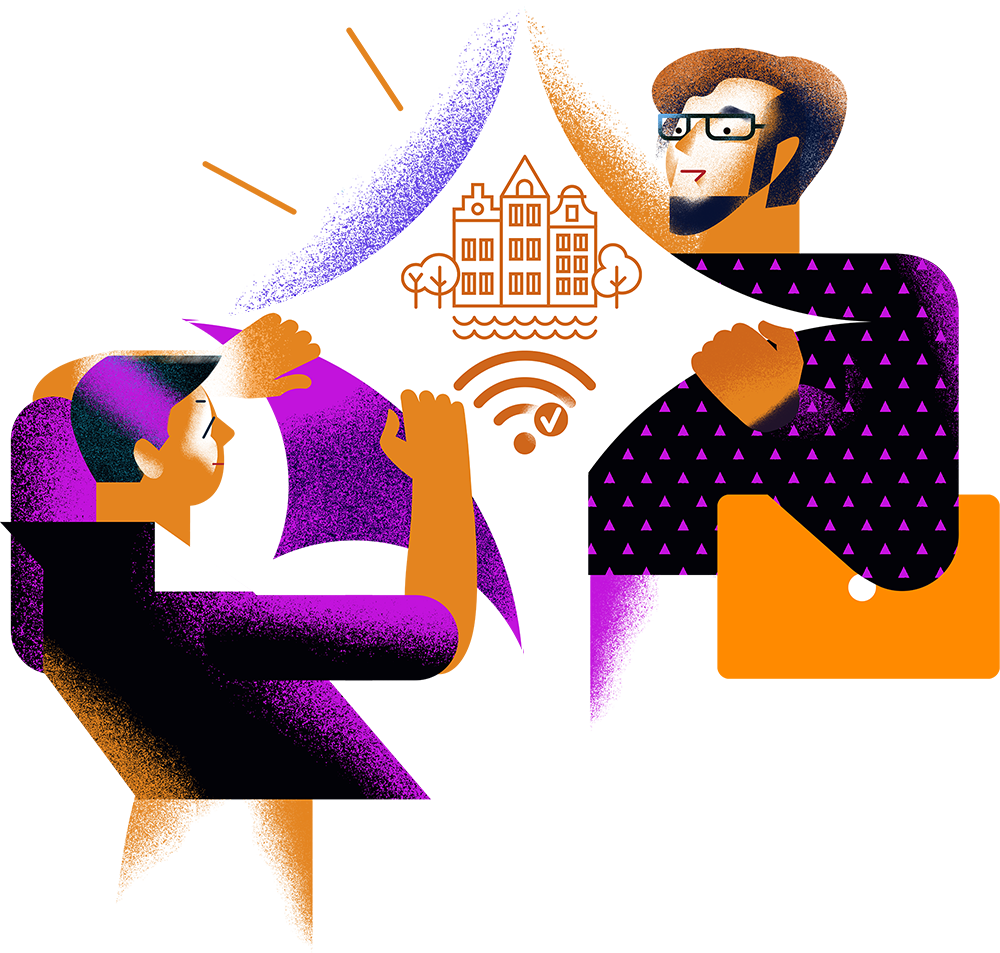On March 24-25, the eighth edition of the “Hackathon Without Borders” took place in Prague. It is a nomadic laboratory for technical and social projects aimed at developing specific solutions to combat internet censorship, propaganda, and disinformation within a short timeframe. According to the rules of the hackathon, each challenge has a predetermined cash prize, and participants have additional five days to bring their work to an acceptable outcome.
The Prague event gathered over forty participants, who proposed several competing solutions for some of the projects. The jury selected the most successful and implemented ones. This time, the emphasis was placed on supporting anti-war initiatives, and many tasks had not only technical but also conceptual and exploratory characteristics. In this brief overview, we would like to introduce you to the most remarkable projects.
Experiencing censorship: VR immersion in the world of blockades
Teplitsa. Technologies for Social Good presented an ambitious and broad task: to devise a new propaganda campaign capable of influencing public perception of censorship and its consequences. Despite strict blockades, there are still those who believe that “censorship does not affect them.” A team of Ukrainian VR artists and developers called ZVIT proposed an original solution to this challenge using virtual reality methods. They conceptualized and developed a virtual dystopian world where visitors immerse themselves in the gloomy atmosphere of a post-Soviet residential area with identical block houses. By exploring this universe of limitations and prohibitions, they discover an “oasis of freedom” – a large glass greenhouse housing a library of knowledge, symbolizing the free internet. You can experience this world yourself by following the link.
How Censors Think? Analysis of State Radiocommunication Frequency Center Leaks
Thanks to recent leaks of archives and documentation from the State Radiocommunication Frequency Center, civil society has gained the opportunity to peek behind the scenes of censorship and learn about new plans for digital control. For instance, the leaked information revealed the existence of systems for analyzing and recognizing textual and visual content such as “Mir” and “Oculus,” as well as a program for predicting public sentiment called “Vepr.” However, despite a few prominent materials, a significant portion of the archive remains unexplored. Teplitsa. Technologies for Social Good posed a challenge to researchers and journalists to delve into the data and uncover previously unpublished interesting facts about the thinking process of the Federal Service for Supervision of Communications, Information Technology, and Mass Media (Roskomnadzor) and the State Radiocommunication Frequency Center, as well as the significant processes occurring within these agencies. A team of two young researchers, one of whom discovered their own file among the leaked documents, successfully tackled the task and is currently working on a comprehensive article to be published on Teplitsa’s website, potentially in collaboration with one of our media partners.
Internet Shutdowns and the War in Ukraine
The international association for the defense of digital rights, AccessNow, proposed a task to investigate the link between internet shutdowns, the dynamics of combat operations, and human rights violations during the Russian military aggression in Ukraine. Existing data on the duration of shutdowns and documented cases of human rights violations served as the foundation for the research. Talon, one of the participants, analyzed the data and proposed an infographic that will be refined and included in AccessNow’s upcoming report.
New Content Delivery Methods in the Face of Strict Blockades: Telegram and Twitter Parsers
One of the most interesting and in-demand technical tasks was proposed by the Lantern project, a popular multi-protocol VPN that continuously works on improving its protocols and closely studies censorship trends in different countries around the world. The Lantern developers presented two tasks at the Hackathon Without Borders: to create parsers for Telegram channels and Twitter, enabling the ability to extract content from these popular social networks in situations of blockade. Developer Artmadiar successfully completed both tasks. You can review the code for Twitter here and for Telegram here. Integration of these developments into the Lantern client is expected in the near future.
Optimizing Digital Security Consultations: Telegram Bot for the “Na Svyazi”(Connected) Project
The non-profit organization “Na Svyazi” assists anyone facing difficulties in the field of digital security. It operates a hotline staffed by volunteers with expertise in information security who are ready to answer questions and recommend specific practices and tools. In order to streamline the work of moderators, “Na Svyazi” proposed the task of developing a Telegram chatbot that can simplify navigation through various materials and guides, providing users with ready-made answers or connecting them with consultants. Participant Mikhel from the Hackathon Without Borders successfully developed a prototype of such a bot, which is now being further developed by the “Na Svyazi” team and will soon be available to a wide audience. In addition to existing guides, the bot also offers users the option to ask a question to ChatGPT if the initial responses do not satisfy their query.
Risk and Security Visualized: Identity and Cards for the “Na Svyazi” Project
Two more tasks from “Na Svyazi” were aimed at visualizing digital security practices and tools. Despite efforts by media and human rights organizations to simplify the understanding of information security concepts and terms, many people still find this topic quite complex. We hope that the visual elements developed by designers Vera Koss and Maksom during our hackathon can help bridge the gap between the language of security experts and the language of users.
Simplifying the Volunteer Verification Process for an Activist Organization
An anonymous activist organization sought help in developing a Telegram bot that could simplify the process of verifying individuals interested in joining their movement. Currently, the process is handled manually by volunteers who review each application. A hackathon participant named Artful Cucumber successfully developed a solution for this challenging task. We are looking forward to the bot’s upcoming presentation!
Redesigning Tools for Decentralized Communications and Circumventing Censorship
The relationship between activists and censors is a constant arms race. While regulatory bodies and censorship authorities invent increasingly sophisticated methods of digital control, civil developers, researchers, and Internet freedom advocates are working on new architectures and censorship-resistant protocols.
However, new tools require new approaches to user interaction. Explaining how a peer-to-peer browser or decentralized messenger works requires rethinking visual and language metaphors.
At the Prague Hackathon Without Borders, several new solutions were presented that required a redesign.
For example, the browser Ceno by the Canadian company eQualit.ie (co-organizers of the “Internet Without Borders”) utilizes a range of technologies that require conceptualization. Designer Vera Koss took on the task of redesigning the comic that explains the browser’s working principle.
The dComms project, also developed by eQualit.ie, offers solutions for communication that are resilient to shutdowns (such as Matrix servers and Mastodon instances in different cities in Ukraine). During the hackathon in Prague, a detailed UX audit was conducted, and recommendations were formulated to improve the project’s interface. Despite the competition, the jury decided to reward two participants, Ekaterina and Evgeniy. Their advice and contributions will be integrated into the new version of https://dcomms.net.ua.
The next Hackathon Without Borders will take place in Berlin on April 28-30. The event will use English as the primary language. Additionally, the upcoming hackathon will span two days instead of one, and work will be organized around four tracks: toolmakers, outreach, research/OSINT, and activism. We anticipate even more new and exciting working solutions to support digital freedoms and anti-war initiatives. Join us and be a part of it!

